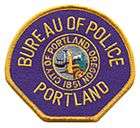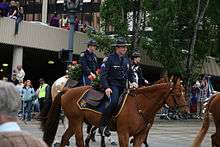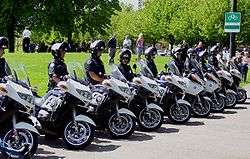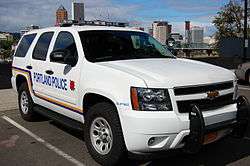Portland Police Bureau
The Portland Police Bureau (PPB), officially the Portland Bureau of Police, is the law enforcement agency of the city of Portland, the largest city in the U.S. state of Oregon. While oversight of Portland's bureaus shifts among the five City Commissioners, the mayor has historically been assigned to the Police Bureau as the police commissioner.
| Portland Bureau of Police | |
|---|---|
 The logo of the PPB | |
| Common name | Portland Police Bureau |
| Abbreviation | PPB |
| Motto | "Sworn to Protect, Dedicated to Serve" |
| Agency overview | |
| Formed | 1870 |
| Preceding agency |
|
| General nature |
|
| Headquarters | Portland Justice Center |
| Civilians | 350 |
| Police commissioner responsible | |
| Agency executive |
|
| Facilities | |
| Precincts | 3[1]
|
| Airplanes | 3 |
| Website | |
| www | |
Services
The Portland Police Bureau is the largest city law enforcement agency in Oregon. The bureau has approximately 900 full-time officers, 50 cadets, and 300 civilian positions. The Portland Police Bureau provides numerous services to the citizens of Portland and the tri-county area,[2] including:
- Patrol

- 9-1-1 and emergency response.
- Detectives
- Portland Police Bureau detectives are members of the tri-county major crimes division, as such they will assist other agencies. Detectives work a variety of tasks such as child sexual assault, burglary and other property crimes, prostitution, narcotics, homicide, traffic crash investigation, hit and runs, auto theft, and other felony crimes.[3]
- Cadets
- Cadets are between the ages of 16 and 21 who serve as non-sworn uniformed volunteers of the Police Bureau. Cadets assist with community service events, parades, crowd control, security, and other special details. Cadets also perform cadet patrols consisting of two cadets in a marked police car assisting officers at traffic collisions, perimeters, paperwork, and taking traffic-related 911 calls. Cadets also ride with police officers as partners, which allows them to perform more tasks.[4]
- Air Support Unit
- The Air Support Unit is used for high risk situations, or for warrant service. Portland Police Bureau currently owns three planes.[5]
- Child Abuse Team
- The Child Abuse Team (CAT) investigates reports of child abuse throughout Multnomah County. CAT is made up of detectives from PPB and Gresham Police, CARES Northwest, and Oregon Department of Human Services.[6]
- Crisis Intervention Team
- Crisis Intervention Team (CIT) officers are assigned in each precinct and aid in dealing with calls with mentally ill people. These officers receive an additional 40 hours of training in dealing with people with mental illness. The CIT program is modeled after Memphis, Tennessee's acclaimed program.[7]
- Crisis Response Team
- The mission of the Portland Police Bureau's Crisis Response Team (CRT) is to intervene in traumatic situations which impact individuals, families, and the community at large.
CRT members provide support to victims of crime, sexual assault, and abuse.[8]
- Hostage Negotiation Team
- The Hostage Negotiation Team (HNT) responds to hostage situations and uses psychology to resolve situations safely without use of force.
- Mounted Patrol Unit
- The mounted police unit was primarily used for crowd control at large events, but also patrolled Downtown and the Northwest District. It was eliminated in 2017.[9]

- Rapid Response Team
- The Rapid Response Team (RRT) is Portland Police Bureau's riot control team, responding to large political rallies/gatherings.
- School Resource Officer
- A School Resource Officer (SRO) responds to crimes within any school within Portland Public Schools. Each Portland high school is assigned an SRO.[10]
- Special Emergency Response Team
- The Special Emergency Response Team (SERT), better known as SWAT, responds to incidents involving uncooperative armed suspects (such as barricaded subjects or hostage situations).
- Transit Police
- About 62 PPB officers operate out of four precincts as transit police on the Trimet system. It is a joint agency along with other local Law Enforcement Agencies and they work alongside TriMet Inspectors and Private Security Guards.

- Traffic Division
- Officers working within the Traffic Division are primarily on motorcycles (instead of police cars). Traffic officers daily tasks include enforcement of driving under the influence laws, aggressive driving watch, response to traffic crashes, and enforcing moving violations. Traffic officers also handle all types of law enforcement emergency calls.[11]
Precincts
The Portland Police Bureau divides Portland into three precincts,[1] with each precinct divided into as many as 20 districts.[12] The divisions are generally in accordance with neighborhood association boundaries, but also take into account the number of police calls generated in each district. The district serves as the basic unit of territory within the bureau, and most are assigned between one and two patrol officers. As such, busier districts are geographically smaller and slower districts are larger.
While the number of officers in each precinct is adjusted continually through transfers, new hires and attrition, the infrastructure of each precinct remains essentially the same. A 2007 attempt by Police Chief Sizer to address this by folding the smallest (and least busy) precinct, North Precinct, into its neighbor, Northeast Precinct, was met by a mobilized North Portland community. North Precinct remains, but has been greatly reduced in overall size. Some past attempts to redraw precinct lines have met similar opposition from neighborhood associations.[13]

Ranks
| Title | Insignia |
|---|---|
| Chief of Police | |
| Deputy Chief | |
| Assistant Chief | |
| Commander | |
| Captain | |
| Lieutenant | |
| Sergeant | |
| Police Officer | |
Weapons
All Portland police officers are armed with a 9mm Glock handgun, either the Glock 17, the Glock 19, or the Glock 26 (in the case of plainclothes assignments[14]). Most uniformed officers' handguns are equipped with SureFire or Streamlight tactical lights. Many uniformed officers also elect to carry a backup handgun; these are not issued by the bureau, but must conform to regulations regarding caliber and type. Besides firearms, all uniform officers carry several non-lethal weapons. Pepper spray, the ASP expandable baton and the Taser are all required pieces of equipment.
All Portland Police Bureau officers are authorized to carry a Remington 870 shotgun (fitted with a tactical flashlight in the foregrip). After completion of bureau courses, officers are also authorized to carry Colt AR-15 rifles and FN 40mm single shot less-lethal launchers.
SERT officers are armed with a variety of additional weapons, including H&K MP5A3 submachine guns, and M4A1 rifles with EOTech holographic sights.
The .45 Glock 21 was once included in the list of handguns that could be used as a service pistol. However, after two incidents in which Glock 21s exploded in the hands of officers at a shooting range,[15] the Bureau abandoned the Glock 21.
History
19th century
From 1851 to 1870 Portland was policed by a marshal, sometimes elected and sometimes appointed, who usually served a two-year term. After 1861, the marshal was empowered to hire deputies, but they did not have permanent jobs until late in the 1860s. Thomas O'Connor, a deputy, became the first Portland officer to die while on duty in a shooting on August 21, 1867.[17] The bureau, originally named the Portland Metropolitan Police Force, was established in 1870 by the Portland City Council. The Council appointed James Lappeus as its first chief of police, in charge of a force with six patrolmen and one lieutenant, at a time when the population of Portland was less than 9,000.[18] The first member of the Metropolitan Police Force to die in the line of duty was Officer Charles F. Schoppe, who was shot to death in June 13, 1874 while trying to disarm a drunken saloon patron.[19]
20th century
On April 1, 1908, the bureau became the first in the United States to hire a female police officer, Lola Baldwin, who became the Superintendent of its newly established Women's Protective Division.[20] In 1915, the "Metropolitan Police Force" changed its name to the Bureau of Police.[21] Four years later, the bureau became the first, in the United States, to use a police radio.[21] Sybil Plumlee, also considered to be a pioneer in the field, served in the Women's Protective Division from 1947 to 1967.[22][23][24] In 1985, Penny Harrington became Portland's first female chief of police, and the first to head a major U.S. police department.[21]
The headquarters of the Portland Police Bureau was in the Portland Police Block until 1984. The 1912 building is now listed on the National Register of Historic Places.
Since 1992, there have been several cases of suspects having died while in custody at the Multnomah County Detention Center.[25]
21st century
In several high-profile cases,[26] including the James Chasse, Jr.[27] and Kendra James[28] incidents, the Portland Police Bureau has been accused of engaging in the abuse of force and then covering up the investigation.[29] The accusations have prompted a Copwatch program in Portland.[30] In neither the Chasse nor the James interactions, were the Portland Police Bureau, nor any sworn officer, found guilty of any criminal wrongdoing.[31]
Police chiefs
Source:[32]
- James H. Lappeus (1st term November 1, 1870 – June 17, 1877)[33]
- Lucerne Besser (June 18, 1877 – October 29, 1879)
- James H. Lappeus (2nd term October 30, 1879 – June 30, 1883)[33]
- William H. Watkinds (July 18, 1883 – April 23, 1884)[34]
- Samuel B. Parrish (April 24, 1884 – July 31, 1892)[35]
- Ernest W. Spencer (August 1, 1892 – November 11, 1892)
- Charles H. Hunt (November 12, 1892 – July 31, 1894 and below)
- John W. Minto (August 1, 1894 – October 5, 1896)
- L. W. "Doc" Robertson (October 6, 1896 – March 10, 1897)[36]
- John Myers (March 11, 1897 – June 8, 1897)
- Patrick J. Barry (June 9, 1897 – July 2, 1897)
- Michael J. Clohessy (July 3, 1897 – June 30, 1898)
- Daniel M. McLaughlin (July 1, 1898 – January 22, 1903)
- Charles H. Hunt (above and January 23, 1903 – July 14, 1905 ? 1906)
- Charles Critzmaucher (July 15, 1906 – July 1, 1909)
- A. M. Cox (July 2, 1909 – June 30, 1911)
- Enoch Glover (July 1, 1911 – June 30, 1913)
- John Clark (July 1, 1913 – July 31, 1917)
- Nelson F. Johnson (August 1, 1917 – November 7, 1919)
- Leon V. Jenkins (November 8, 1919 – June 30, 1933 and below)
- Burton K. Lawson (July 1, 1933 – November 30, 1934)
- Harry M. Niles (December 1, 1934 – June 30, 1946)
- Leon V. Jenkins (above and July 1, 1946 – January 5, 1948)
- James Fleming (January 6, 1948 – December 31, 1948)
- Charles P. Pray (January 1, 1949 – April 30, 1951)
- Donald I. McNamara (April 1, 1951 – January 2, 1953 and below) [dates given conflict]
- James W. Purcell Jr. (January 1, 1953 – January 1, 1957)
- William J. Hilbruner (January 1, 1957 – November 12, 1960)
- David H. Johnson (November 21, 1960 – July 8, 1964)
- Donald McNamara (acting Chief July 9 – 22, 1964. Chief July 23, 1964 – January 1974)
- Bruce R. Baker (January 15, 1974 – May 31, 1981)
- Ronald R. Still (June 1, 1981 – January 4, 1985)
- Gary M. Haynes (January 4, 1985 – January 23, 1985)
- Penny Harrington (January 24, 1985 – June 2, 1986)
- Robert M. Tobin (June 2, 1986 – August 20, 1986)
- James T. Davis (August 20, 1986 – April 7, 1987)
- Richard D. Walker (April 7, 1987 – November 18, 1990)
- Thomas J. Potter (November 19, 1990 – June 29, 1993)
- Charles A. Moose (June 29, 1993 – August 1999)[37]
- Mark A. Kroeker (August 1999 – August 29, 2003)[38]
- Derrick Foxworth (August 29, 2003 – June 2006)[39]
- Rosie Sizer (June 22, 2006 – May 12, 2010)[40][41]
- Michael Reese (May 12, 2010 – Jan 2, 2015)[41]
- Larry O'Dea (Jan 2, 2015 – March 27, 2016)[42]
- Donna Henderson (Interim) (March 27, 2016 – June 27, 2016)
- Michael Marshman (June 27, 2016[43] – October 2, 2017)
- Danielle Outlaw (October 2, 2017 – December 31, 2019[44])
- Jami Resch (December 31, 2019 – June 8, 2020[44])
- Chuck Lovell (June 8, 2020 – current)
See also
References
- Precinct information from the PPB website
- "Organizational Chart". City of Portland.
- "Detective Division". PPB.
- "Cadet Division". PPB. Archived from the original on 2011-09-02. Retrieved 2011-11-19.
- "Air support unit". PPB.
- "Child Abuse Team". PPB.
- "Crisis intervention team". City of Portland.
- Jackson-Johnson, Marci. "Crisis Response Team". City of Portland.
- Redden, Jim (July 6, 2017). "Mounted patrol put out to pasture: After four decades of service, the Portland Police Bureau is eliminating its popular horse mounted patrol unit". Portland Tribune. Retrieved 2017-08-31.
- "School resource officer". PPB.
- "Traffic division". PPB.
- "Precinct and district map" (PDF). City of Portland. Retrieved 2011-11-13.
- The NPBA Bulletin Board (a Blogger-based blog last updated in 2008)
- "Portland Police Bureau Manual of Policy and Procedure". The City of Portland. January 2009. Retrieved 2014-02-16.
- "Possible Officer Safety Issue Related to Glock Model 21 Handguns". PoliceOne.com. March 30, 2004. Retrieved 2009-08-14.
- Molly Harbarger (4 June 2020). "Portland protest calls for 'nonviolent' resistance against police brutality Thursday; 12 arrested in overnight unrest". oregonlive. Retrieved 5 June 2020.
Police said their sound truck “became a target of the group’s aggression” as officers continued to disperse the crowd. They said lasers were shined at the driver and rocks and glass bottles were thrown at the truck.Police said they used a Long Range Acoustic Device twice “to defend themselves from these criminal and dangerous acts.”According to a 2009 New York Times report, such devices are powerful speakers that can also emit a very loud, siren-like noise. The devices are known by their acronym, LRAD, and are referred to as “sound cannons.”
- "Memorial and Fallen Officers". Portland Police Museum.
- "Portland City Marshals and Police Chiefs". Portland Police Museum.
- "Memorial and Fallen Officers". Portland Police Museum. Retrieved 25 July 2019.
- "Lola G. Baldwin". opb.org. Retrieved 4 July 2015.
- O'Hara, Ralph. "The History of the Portland Police Bureau; A Look Back". Retrieved 2009-08-14.
- "Obituaries – Jan. 12, 2012: Sybil Plumlee". Lake Oswego Review. Lake Oswego, Oregon: Pamplin Media Group. January 12, 2012. pp. 1–2. Retrieved July 6, 2016.
- Newell, Cliff (May 12, 2011). "Portland policewoman turns 100 in Lake Oswego". Portland Tribune. pp. 1–2. Retrieved February 8, 2012.
- Hallman, Jr., Tom (January 12, 2012). "'She was one of a kind,' family says of Sybil Plumlee, one of Portland's first female police officers". The Oregonian. Advance Publications. ISSN 8750-1317. Retrieved February 8, 2012.
- Portland Police Shootings and Deaths in Custody: 1992-May, 2008 from portlandcopwatch.org
- Bernstein, Maxine (March 30, 2004). "Man killed by police unarmed: Portland officials have not said why an officer shot James Jahar Perez". The Oregonian.
- "Why Did James Chasse Jr. Die?". Willamette Week. November 1, 2006. Retrieved 2016-07-06.
- "Officer who shot, killed homicide suspect also shot Kendra James". KGW. May 15, 2008. Archived from the original on July 4, 2008. Retrieved 2009-08-14.
- Woodcock, Diane Lane (August 2005). "The Kendra James trial: Was justice served?". Portland Alliance.
- Zuhl, Joanne (November 5, 2007). "Cops vs. Private Eyes". Street Roots. Street News Service.
- "No indictment in Chasse death". The Oregonian. October 18, 2006. Retrieved 2009-05-18.
- "Portland's Chiefs of Police". Portland's Finest, Past & Present. Turner Publishing Company. 2000. p. 13. ISBN 1-56311-599-9. Retrieved 2011-11-13.
- "James H. Lappeus". Portland Police Museum & Historical Society. Retrieved 5 June 2017.
- Sacramento Daily Union, Volume 17, Number 126, 19 July 1883, page 3, column 5
- Daily Alta California, Volume 36, Number 12426, 24 April 1884, page 8, column 3
- Marin Journal, Volume 37, Number 2, 18 March 1897, page 1, column 3
- Charles Moose Sworn In as 15th Montgomery County Police Chief Archived 2011-09-27 at the Wayback Machine, an August 2, 1999 press release by Montgomery County, Maryland
- Top Cop, a November 10, 2004 article from Willamette Week
- Rob Manning. "Former Police Chief Foxworth Retires From The Force". opb.org. Retrieved 4 July 2015.
- Portland's police chief replaced following scandal, a June 22, 2006 AP article via The Seattle Times
- Technically, Rosie Sizer is still a Portland police chief a May 13, 2010 blog post from The Oregonian
- "Chief Larry O'Dea - Biography". portlandoregon.gov. 1 April 2015. Retrieved 4 July 2015.
- Bernstein, Maxine (June 27, 2016). "Portland mayor appoints new police chief in wake of 'turmoil and confusion' over shooting scandal". The Oregonian. Retrieved 2017-10-03.
- Zielinsky, Alex (December 31, 2019). "Portland Has a New Police Chief. How Did That Happen So Quickly?". Portland Mercury. Retrieved 2020-01-17.
External links
| Wikimedia Commons has media related to Portland Police Bureau, Oregon. |